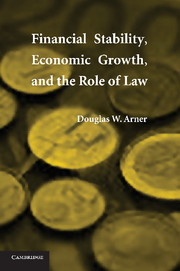Book contents
- Frontmatter
- Contents
- Introduction
- PART ONE FINANCE AND THE INTERNATIONAL FINANCIAL ARCHITECTURE
- PART TWO FOUNDATIONS OF FINANCE
- 3 Preconditions for and Institutional Underpinnings of Finance
- 4 Central Banking and Financial Policy
- 5 Financial Infrastructure
- PART THREE FINANCIAL REGULATION AND SUPERVISION
- PART FOUR LOOKING FORWARD
- Index
5 - Financial Infrastructure
Published online by Cambridge University Press: 25 July 2009
- Frontmatter
- Contents
- Introduction
- PART ONE FINANCE AND THE INTERNATIONAL FINANCIAL ARCHITECTURE
- PART TWO FOUNDATIONS OF FINANCE
- 3 Preconditions for and Institutional Underpinnings of Finance
- 4 Central Banking and Financial Policy
- 5 Financial Infrastructure
- PART THREE FINANCIAL REGULATION AND SUPERVISION
- PART FOUR LOOKING FORWARD
- Index
Summary
This chapter builds on the foundations established in the previous two chapters and looks to the elements of legal, institutional and market infrastructure necessary for developed and sophisticated financial systems to function properly – what could be called essential financial infrastructure. Aspects include insolvency regimes, corporate governance, and financial information frameworks such as accounting and auditing systems. These are supported by appropriate measures to protect market integrity and thus confidence in the financial system. It is only when both the foundations and the supporting infrastructure are in place that financial regulation and supervision, in conjunction with appropriately sequenced financial liberalization (discussed in Chapter Eight and Part V) can function properly to support developed and sophisticated financial systems.
While the following list is by no means exhaustive, these core areas are of great importance and, when combined with an appropriate “third level” of financial regulation and supervision discussed in the next part, create the necessary environment for the development of an effective financial system.
First, adequate company law and securities regulation incorporating principles of good corporate governance are essential for corporatization, privatization and the development of a modern decentralized financial system. Prospective investors need to be assured that the legislative and contractual frameworks within which corporate entities operate provide adequate protection of their legitimate interests and expectations. The importance of effective corporate governance has been underlined by the Group of Seven (G-7), Organization of Economic Cooperation and Development (OECD) and recent international financial crises.
- Type
- Chapter
- Information
- Financial Stability, Economic Growth, and the Role of Law , pp. 154 - 192Publisher: Cambridge University PressPrint publication year: 2007



